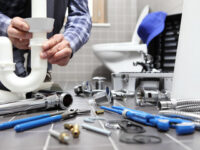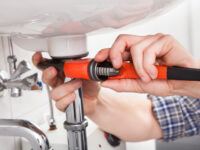Residential Plumbers
Residential Plumbers focus on plumbing tasks that occur in home-based environments. These include piping, toilets, and sinks. They may also handle clogged drains and sewer lines.

Commercial plumbers deal with pipe systems within larger buildings like office spaces, shopping centers, and restaurants. They typically have to comply with more stringent regulations and specified work hours.
Residential plumbers specialize in installing, repairing, and maintaining plumbing mechanisms within residential homes. Their work can include everything from septic tanks to water heaters to drain pipes. These professionals are also skilled at handling home renovations and new construction. They can install and repair toilets, showers, bathtubs, and sinks. They may even be called to work on sewer systems, although this is less common.
Residential plumbing services are typically provided on an hourly basis, and they can handle all types of problems related to the home’s water supply. This includes issues like broken or leaky faucets, clogged drains, and sewer backups. Some homeowners choose to hire a residential plumber for a one-time service call, while others opt for a retainer agreement that provides regularly scheduled maintenance.
The scope of residential plumbing is much smaller than commercial plumbing. This is because residential plumbing concerns the water and sewage systems of a single-family home. Commercial plumbing, on the other hand, deals with large buildings that have expansive plumbing to accommodate hundreds of people. This type of plumbing is more complicated and requires a higher level of knowledge regarding building code requirements and permitting.
In addition to installing new fixtures and piping, residential plumbers often provide emergency repairs. They can fix a leaking water heater, unclog a drain or sewer line, and repair or replace faulty toilets, showers, bathtubs, sinks, and water meters. Residential plumbers may also install or repair water filters and other devices that are designed to purify the home’s drinking water.
Another way that residential plumbing differs from commercial plumbing is that the former usually doesn’t require a permit. However, it’s always a good idea to check local codes and regulations before beginning any job.
When looking for a residential plumber, make sure the professional you hire is licensed and insured. This will protect you in the event that something goes wrong during the service call. You should also ask the plumber about their experience, education, and training. You want to be sure that they have the skills and knowledge required to tackle any job you might throw at them.
Maintenance
As part of their services, residential plumbers can also perform regular maintenance on plumbing systems. This includes checking the status of water pipes, fixing leaks, and cleaning drain clogs. This prevents small issues from becoming bigger problems that can cause a lot of inconvenience in the home. It is recommended that homeowners book a residential plumber yearly to check and maintain their plumbing systems.
Plumbing is a complex job that requires technical knowledge, problem-solving skills, and strong communication. It is essential to hire a professional plumber who is licensed and insured. A trustworthy plumber can provide reliable, quality service at a fair price. Make sure to ask if they offer a free estimate, emergency plumbing services, and financing options.
While some plumbers may choose to focus solely on residential work, others prefer to do a mix of commercial and residential jobs. This is because each has its own unique responsibilities and challenges. For example, working on the plumbing system of a large building requires different tools and skills than repairing a toilet in a single-family home.
Whether you’re looking for a residential or commercial plumber, be sure to find one that has the right experience and credentials for the job at hand. A good plumber should be able to diagnose and fix the issue at hand quickly, efficiently, and correctly. They should also be able to work well under pressure and meet deadlines.
In addition to installing and repairing pipes, plumbing services also include maintaining the water supply and waste removal systems in both residential and commercial buildings. The main difference between the two is that commercial buildings usually have more complicated and extensive plumbing systems than homes. Therefore, commercial plumbers must be able to deal with industrial-grade fixtures and pipes that are often much larger than those found in homes.
Plumbing services are essential for keeping both residential and commercial spaces in good condition. It’s important to choose a plumber that offers 24/7 emergency services because you never know when you might need them. A plumber who can respond quickly to your needs will be a valuable asset in the long run.
Repair
Residential plumbers handle issues with home appliances like water heaters, sinks, toilets, and other fixtures that supply and drain water in homes. They can also repair drain lines, water leaks, and more. Plumbing problems are often urgent and must be resolved as soon as possible to avoid serious damage. It’s important to find a reliable plumbing service with round-the-clock availability to help homeowners when they need it most.
A residential plumber can work with any client, but they are most likely to interact with homeowners and renters. They may also be called to perform maintenance on homes or assist with construction projects related to a new addition. Many of the same repairs that are performed by commercial plumbers can be done by a residential plumber, but the focus is usually on fixing existing plumbing systems.
The most common issue that a residential plumber will encounter is dealing with clogged pipes and drains. In a home, this is typically a simple matter of using a drain snake to clear out a sewer line or a drain in the kitchen, bathroom, or shower. In larger buildings, such as apartments or condominiums, a residential plumber might have to clear out the entire line of drains on each floor.
One of the main differences between residential and commercial plumbing is that it’s harder to pinpoint the source of an issue in a large building. Leaks might be difficult to notice in a home, but in a building with multiple floors and many people using the same plumbing system, even a small leak could cause significant damage over time.
In some cases, a residential plumber might need to replace an entire unit of plumbing in a home, such as replacing a whole hot water heater or installing a brand new dishwasher. This type of project requires a lot more skill and knowledge than repairing a single pipe or drain, but it can still be done by a professional. The right plumber will have the experience and knowledge to handle such an installation job with ease. When choosing a residential plumber for a large project, it’s important to check reviews and recommendations from previous clients.
Troubleshooting
Plumbing issues are a common occurrence in homes and often pop up without warning. They can be minor inconveniences like clogged drains or major structural problems like burst pipes. Whatever the issue, it’s important to resolve it promptly before it gets worse. A residential plumber will be able to assess the situation and provide the necessary plumbing services to keep you and your home safe.
While many people only call a plumber when they have an emergency, it’s best to get them in regularly to perform checks and inspections. This will help identify potential issues and make them easier to fix. A professional plumber will be able to ensure your plumbing is working as it should and catch any issues before they turn into expensive repairs.
Apart from regular maintenance and repair services, plumbers can also offer a range of troubleshooting services. This includes identifying and fixing the source of the problem, such as a leak or blocked drain. They can also install water-saving fixtures and inspect the entire plumbing system to ensure there are no issues.
As the name suggests, residential plumbers focus on plumbing in a single-family home. They can install and repair toilets, taps, showers, and sinks, as well as maintain and replace hot water systems. They can also deal with larger-scale plumbing problems, such as septic systems and lift stations.
Commercial plumbers work on a wider range of buildings, including restaurants, hospitals, and skyscrapers. Their responsibilities are more complex than those of residential plumbers, and they need to have a greater understanding of how the different systems work together. They also need to be able to handle more industrial-grade equipment, such as water heaters and garbage disposals.
Both types of plumbers can offer a range of other services, such as installing gas appliances and repairing heating systems. They can also reroute pipes when renovations or extensions are being done. While these aren’t typical daily tasks for residential plumbers, they’re useful services that can save you a lot of money in the long run.




